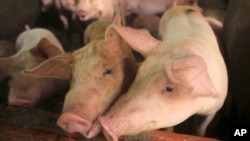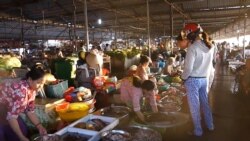Australians and Vietnamese are getting into a beef over pork.
After news last month that Australia withdrew a visa for a Vietnamese woman who brought pork to the country, another Vietnamese citizen faced the same punishment for a similar offense this month, prompting the Australian government to release an official statement on the matter.
The first time the pork crime happened, the reaction in Vietnam was one of bemusement. Local newspapers asked, "a woman didn’t declare the pork in her luggage and got deported?" It wasn’t exactly cannabis or rhino horns. Locals made light of the news.
Australia “has plenty of stuff like Vietnam, why transport anything and make things difficult?” one commentator said in the state controlled Tuoi Tre newspaper.
But by the time of the second offense, Australia explained why it was more serious than a few undeclared items: swine flu.
“Travelers are banned from bringing most pork products from African swine fever countries into Australia.” Australian Minister for Agriculture Bridget McKenzie said in a statement released last week. “It’s one of the heightened measures our government put in place to keep the devastating disease out of Australia and to protect our 2,700 pork producers.”
Although the two Vietnamese travelers appeared to be just bringing presents to relatives, they got caught up in a cross-border kerfuffle. Swine flu has been wreaking havoc across Asia, especially in the huge markets of China and Vietnam, where pork is a meat staple. These two and other nations have had to cull millions of pigs to contain the outbreak. Amid the pork shortage, prices have nearly doubled in some places in the past year, and China has reconsidered its limitations on U.S. pork imports despite the two sides fighting a trade war.
Bridget McKenzie said Australia had reason to worry that the outbreak could spread.
“A recent round of testing found nearly 50 percent of pork products seized from air travelers tested positive for African swine fever,” she said.
Still, many in Vietnam defended the travelers, feeling deportation was a grave punishment for an honest mistake. Australia could have confiscated the offending items and then allowed the travelers to proceed. Instead it deported them and prohibited them from returning for three years.
“We should also sympathize with her because she was just used to eating things a certain way in Vietnam,” netizen Hoang Tran said of the female traveler on Facebook.
Australia and Vietnam have an interest in maintaining a good relationship. Australia has had a huge population of Vietnamese since the Vietnam War, and it continues to receive many students going abroad for university.
Vietnam is one of Australia's fastest growing trade markets in Southeast Asia, with trade growing approximately 12 percent a year on average, according to the Australian Trade and Investment Commission.
Australian Ambassador to Vietnam in Hanoi Robyn Mudie underscored the importance of that relationship.
“Australia appreciates Vietnam’s support in helping to protect Australia from serious biosecurity threats and hopes that travelers from Vietnam can continue to enjoy Australia’s hospitality,” she said.





